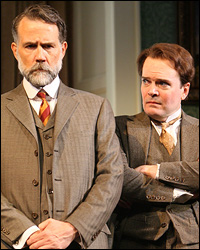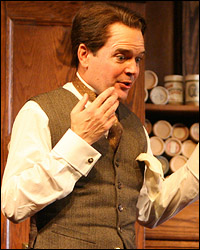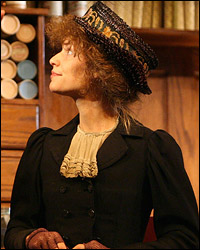
*
Pygmalion, George Bernard Shaw's tract about attaining social mobility through proper elocution, landed at the American Airlines Theatre Oct. 18, 2007 — its sixth appearance on Broadway since its arrival here Oct. 12, 1914. You thought more, right? That's because running along side the play, in our mind and DNA, is classic Lerner and Loewe.
The rich-witted speechifying of the play falls on the ears of a modern audience like musical lead-ins. When Alan Jay Lerner first suggested making My Fair Lady out of Pygmalion, The Bearded Wonder shot off a terse no-thanks: "I think my words make their own music," Shaw shared.
Roundabout Theatre Company is now putting that edict to the acid test with a production that returns to the original text and intent — a play without music per se and minus the happy ending the world is waiting for. Shaw steadfastly resisted any whiff of romance between his phonetics expert, Henry Higgins, and Eliza Doolittle, the guttersnipe flower-peddler he transforms through rigorous diction exercises into the illusion of a refined, fair lady.
Since the play's debut, Shaw had shouted down the idea of a romantic resolve (with Eliza returning to Higgins), yet that ending was sprung on him in 1938 at a preview the night before Pygmalion opened as a movie with Wendy Hiller and Leslie Howard. Shaw did write the screenplay and won an Oscar ("This is an insult," he said). He didn't write that ending, however. He insisted only his words be used, so the enterprising producer used the "slippers" line from earlier in the play. The remark was later borrowed to be the climax of My Fair Lady, as well. Director David Grindley, who helmed last season's rightly acclaimed and ridiculously underattended Journey's End, re-enforces the anti-romantic ending. Most productions end with Higgins' scoffing laugh that Eliza is altar-bound with the high-born but otherwise worthless Freddy Eynsford Hill ("Marry Freddy!" is the professor's exclamation), but Grindley goes back to the 1912 text and has Higgins staring forlornly at the audience after Eliza's dry-eyed and emphatic exit.
"'Marry Freddy!' was a revision that came when, after the original production, Shaw was trying to ensure that the audience knew it wasn't a romance," Grindley proffered. "That line was written for later productions. We're doing the original text. What I tried to do is really mine the text for everything that it could possibly offer. Higgins is described as just being in his 40s. He is also described as being a child a lot. He is so caught up in his work and objectifying people that he is unaware of the emotional consequences that he has on others — and he discovers his emotions in the course of the play, particularly at the end where he realizes that he really feels for Eliza — not necessarily in a romantic way. She's built into his house. He wants her to remain, but, by that stage, she's decided she is going to lead her own life in her own way and she's off on her own. The ending is very ambivalent. He doesn't know where he stands."
| |
 |
|
| Boyd Gaines and Jefferson Mays in Pygmalion | ||
| photo by Joan Marcus |
The design team is identical — Jonathan Fensom (sets and costumes), Jason Taylor (lighting — some might say underlighting) and Gregory Clarke (sound) — painting this production, if not on the dark side, at least worlds removed from Cecil Beaton. The curtain rises on what appears to be a dreary Covent Garden Theatre, pelted by rain. A dark and stormy night, I'm sorry, is the only way to describe it.
"I was very fortunate that so many people around me during that experience wanted to make Pygmalion work," Grindley said, "and it's great that they all came aboard."
At the show's afterparty, held at the Marriott Marquis, Mays pleaded guilty to an eclectic career. "I'm afraid so," he admitted. "People just don't know what to do with me. It's endlessly vexing to my agent." But it keeps him deliriously free from being typecast. His first Broadway appearance after winning the Tony as the persecuted transvestite in I Am My Own Wife was the gourmet-wannabe cook in the trenches of Journey's End, and the gag going round at the time was: "They got him out of the dress but not out of the kitchen." In between he did Victor Moore's meek veep role in an Encores! version of Of Thee I Sing.
Gaines, sporting a Colonel Schweppes beard as elegant as his King's English, was doubtlessly cast for kindness as Colonel Pickering — a commodity that particularly comes to the fore in close proximity to Higgins, who obviously has never been near a charm school. "We had a terrific time," he said of the close-knit interplay he has with Mays.
Punctuating these two British outings was a much-too-short stint as Patti LuPone's buffer/foil in Gypsy at City Center. Yes, Gaines is up to doing that again — "if they ask me, if it happens. The last rumor I heard is that Gypsy will happen again — here first, then maybe London."
| |
 |
|
| Jefferson Mays in Pygmalion. | ||
| photo by Joan Marcus |
Although he plays Doolittle big and broad-stroked for laughs, he considers the character a sizable cut above in buffoonery department. "Bush [in Stuff Happens] I would call a buffoon, but I think of this man as a very smart guy. He comes in looking as if he's at a disadvantage, but he never is. In a funny way, he's Shaw's voice, the smartest guy on the stage."
To do the part required a lot of deft juggling of Sanders' work-schedule. He would record narration for documentaries on PBS's "Wide Angle” in the AM, rehearse Doolittle in the afternoon and play (a very well-received) Bottom in A Midsummer Night's Dream at night up in Central Park. "It was hard on everyone. How I survived it, I don't know, but Roundabout was very patient about letting me do it. They wanted me to do it. And it's turned out very well. It nearly choked me on the way, but it makes me that much more pleased that we got to where we did."
Helen Carey, who made her Tony-nominated Broadway debut a decade back with Roundabout in London Assurance ("that was Dion Boucicault, but very Shaw-like"), had a high old time of it as Henry's haughty mother. Note the lofty way she takes exception to Eliza's "deliciously low" small talk — she comes down from on high to utter the line, "It's perfectly good to say on a canal barge." She was clearly reveling in her return to The Great White Way: "I just had a ball, and I particularly liked seeing the brilliant, young, intelligent, talented woman come into her own on stage. I know she has been wowing audiences on film, but it's a different animal to get on the stage. I just think she was glorious tonight really and truly."
| |
 |
|
| Claire Danes in Pygmalion | ||
| photo by Joan Marcus |
Director Grindley seconded that motion in spades: "All you want from an actor is that they remain open and as fierce as they possibly can, particularly for her who's doing it for the first time. What was fantastic for her that she never at any moment — although, obviously, she was nervous about what she was getting herself into — she never at any moment withdrew or became inhibited. The things she was having trouble with — she absolutely learned and is delivering a fantastic performance. It is a very, very difficult part for someone who's extremely experienced, much less for someone who's doing it for the first time. She's done a tremendous job. I'm absolutely delighted with her." Kent-born Sandra Shipley put some authentic English on the role of Freddy's mum, Mrs. Eynsford-Hill. "I liked working with David a lot," she admitted. "I'm English so there's a sensibility there, and I haven't worked with a Brit for a while as a director. There's a shorthand somewhere — phrases he would come up with took me home."
This prompted a funny story she tells on herself: "On the subway going home, one of the cast members heard the people next to him talking about the show, and they said, 'I really liked it. Some of the accents were a bit odd, though — that mother and daughter. Where was she meant to be from, that mother?'"
There was a contingent from Is He Dead? walking amongst us — Patricia Conolly, the habitually employed Byron Jennings, designer Martin Pakledinaz. (The Mark Twain antic, now in rehearsal, will play Broadway's Lyceum.) A blitz from The Ritz arrived late after their show (Ryan Idol, Rosie Perez in a Liza-like man's hat, Ashlie Atkinson, Teddy Coluca, author Terrence McNally, Angela Pietropinto) as did a faction from the other Roundabout show in town (at the Laura Pels), The Overwhelming (Sam Robards, author J.T. Rogers).
Also in attendance: Hugh Dancy, the chronically reliable and brand-new Theater Hall of Famer Dana Ivey, In My Life's Christopher J. Hanke and Company's Elizabeth Stanley (both bound for the La Jolla Playhouse on Monday for the Cry-Baby tryout), Jason Antoon, Chloe Sevigny with director Scott Elliott, Brooke Shields, Mamie Gummer, Blythe Danner (with fingers crossed for a TV show that would be NYC-made), Amy Irving, designer Zac Posen, Jessica Hecht, Pig Farm playwright Greg Kotis (whose new opus, Yeast Nation, just opened waaaaay out of town — in Juneau), Gaby Hoffman, directors Walter Bobbie and Mark Brokaw, "The Hours" author Michael Cunningham, playwright Lynn Nottage, lyricist Sheldon Harnick, John Weidman (still Bounce-ing with Stephen Sondheim, angling for The Public), Brian Murray and Marian Seldes (who will play Doolittle and Mrs. Higgins in the monthly reading of Shaw at The Players Club on Dec. 17), Dan Sullivan, Frances Sternhagen (checking out the play's Sarcastic Bystander — her son, Tom Carlin), Carolyn McCormick, Side Man's author and director Warren Leight and Michael Mayer, and I Am My Own Wife's director Moises Kaufman.
Doug Wright, who won the Tony and the Pulitzer Prize for I Am My Own Wife designing the role of transvestite Charlotte von Mahlsdorf to Mays' specifications, was quite taken with the actor's new look: "I thought it was splendid. That boy can even act in trousers."










